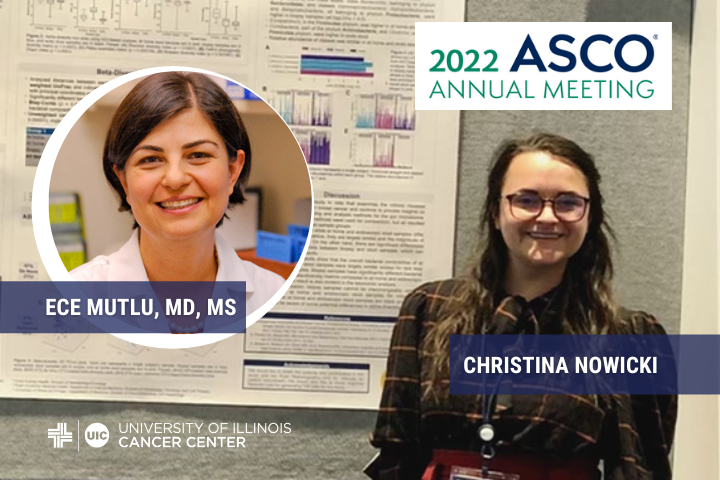
Christina Nowicki had never before attended the American Society of Clinical Oncology’s annual meeting until this year. Her initial experience will not be forgotten.
Nowicki, who works in the laboratory of University of Illinois Cancer Center member Ece Mutlu, MD, MS, and is entering her fifth year as a doctoral candidate at Rush University, received the 2022 GRASP Advocate Choice Award for her poster she displayed at the conference. The honor provided her the opportunity to discuss her work during a panel presentation.
Under the guidance of Mutlu, a gastroenterologist in the Division of Internal Medicine at the University of Illinois College of Medicine and member of the Cancer Center’s Translational Oncology program, Nowicki’s research focuses on understanding how the gut microbiome impacts hormone metabolism in postmenopausal women with breast cancer. Mutlu, Nowicki said, has been “fundamental in helping me develop this research, and has been beyond supportive of my overall research journey. Her experience as a clinician in cancer research has been incredibly insightful as I continue to pursue my own research related to cancer development and prevention.”
Said Mutlu of her student and her work: “Christina is a superstar. She has achieved so much in the short timeframe she has been in our lab. I feel honored to be a mentor to her.”
Nowicki’s poster specifically examined methods for sampling the gut microbiome in breast cancer patients.
“It is well known that estrogen exposure is a major risk factor for breast cancer,” Nowicki said. “Estrogen levels can be affected by the gut microbiome through enterohepatic circulation. No studies regarding gut microbiome changes in breast cancer have examined the colonic mucosal microbiome, and there is no data on which types of gut microbiome studies would be most relevant to the study of the microbiome in breast cancer.”
Nowicki compared three different sample types – home-collected stool, endoscopically collected stool, and colonic biopsy samples, and concluded that Actinobacteria and Firmicutes were the predominant phyla in home stool samples, while Bacteroidetes and Proteobacteria were higher in abundance in colonic biopsy samples.
GRASP: Guiding Researchers and Advocates to Scientific Partnerships is a patient-led program aimed at bringing patient advocates and researchers together to learn from one another and share unique perspectives as they work toward progress in cancer research. The program was established by Christine Hodgdon and Julia Maues, two women living with metastatic breast cancer who made it their life’s mission to drive more impactful research and make faster progress to end cancer. This is the third year ASCO has collaborated with GRASP.
“I honestly could not be more honored to receive this award, especially from a patient-focused group such as GRASP,” Nowicki said. “Having the chance to discuss this research with breast cancer patients, survivors, and advocates has been an incredibly insightful opportunity, and I’m very grateful to be selected to participate.”
